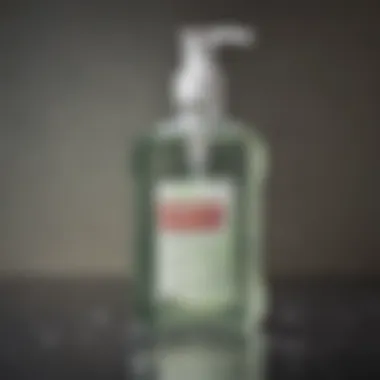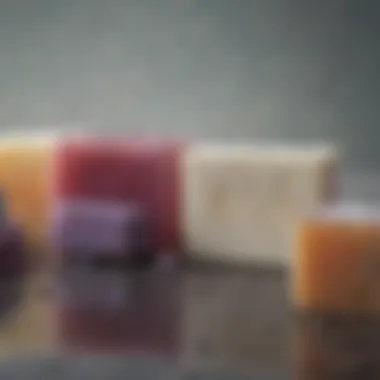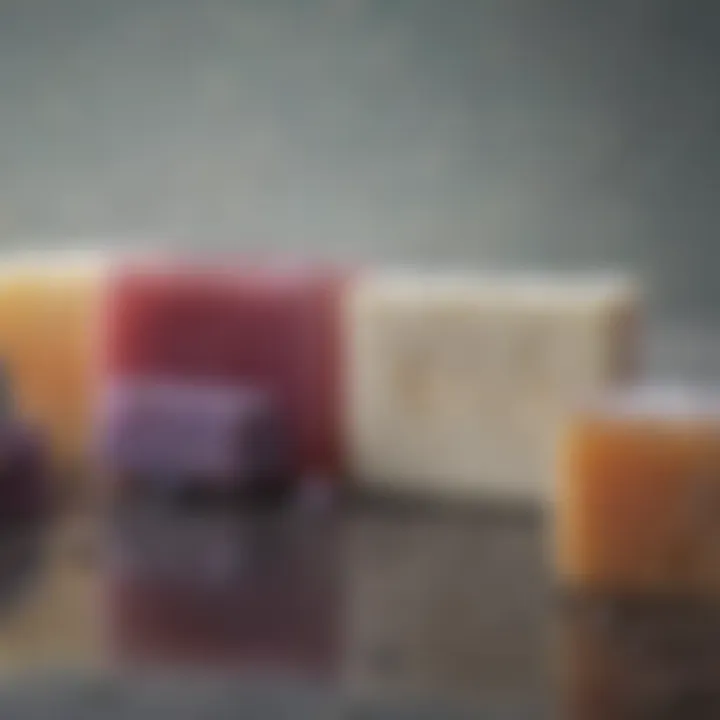Understanding Soap for Chest Acne: Insights and Recommendations


Intro
Chest acne is a common and often overlooked skin condition that affects many individuals. Unlike facial acne, chest acne can present unique challenges due to its visibility and the impact it can have on self-esteem. Understanding the right skincare practices is crucial in managing this condition effectively.
In this article, we explore the relevance of soap specifically formulated for acne-prone skin. The choice of soap can play a significant role in maintaining skin health, clearing existing breakouts, and preventing future occurrences. We will discuss various ingredients known for their effectiveness, delve into tailored approaches for different skin types, and highlight practical recommendations. By the end, readers will be better prepared to make informed decisions on soaps that can help combat chest acne.
The Role of Soap in Managing Chest Acne
The right soap can be instrumental in an effective skincare regimen for chest acne. Soap removes dirt, oil, and dead skin cells that contribute to clogged pores. It is essential to choose products that are gentle yet effective.
Key Ingredients to Look For
Certain ingredients in soap can enhance its pore-clearing ability. Here are some beneficial components:
- Salicylic Acid: This beta-hydroxy acid helps exfoliate the skin and break down debris in pores.
- Benzoyl Peroxide: Known for its antibacterial properties, it fights acne-causing bacteria effectively.
- Tea Tree Oil: A natural ingredient recognized for its antifungal and antibacterial benefits.
What To Avoid
Not all soaps are suitable for acne-prone skin. It is best to avoid:
- Sodium Lauryl Sulfate (SLS): Often found in many soaps, this can be too harsh and irritating.
- Excess Fragrance: Artificial scents can trigger allergic reactions and worsen acne.
- Heavy Oils: Ingredients like coconut oil may clog pores in some individuals.
Lifestyle Measures for Effective Management
Aside from choosing the right soap, specific lifestyle adjustments can support clear skin on the chest.
- Hydration: Drink plenty of water to keep skin hydrated, which can prevent excessive oil production.
- Diet: Maintain a balanced diet rich in antioxidants, as this can help reduce inflammation.
- Avoid Tight Clothing: Breathable fabrics reduce sweat and irritation on the skin.
End
Understanding the nuances of soap in the treatment of chest acne is vital. By selecting products that cater to specific skin needs and adopting supportive lifestyle changes, individuals can see significant improvements in their skin health. This article aims to guide readers through the process of selecting the best soaps and integrating them into their practical skincare routines, ensuring a path towards clearer skin.
Prelude to Chest Acne
Chest acne is a common skin concern that affects individuals across various age groups. Understanding this condition is crucial, as it is often overlooked when compared to facial acne. Chest acne can significantly affect confidence and comfort, prompting the need for effective management strategies. This section will provide a comprehensive insight into the nature of chest acne, its causes, and the misconceptions surrounding it.
Definition and Causes
Chest acne, like facial acne, arises from the blockage of hair follicles with oil, dead skin cells, and bacteria. This can lead to various types of blemishes, including pimples, cysts, and nodules. The primary triggers for chest acne include hormonal fluctuations, excessive sweating, and certain medications. Factors such as lifestyle and skin type play a significant role in its development. For instance, wearing tight clothing can exacerbate the condition by trapping heat and moisture. Additionally, some individuals may be genetically predisposed to acne, making them more susceptible regardless of their skincare routine.
Factors contributing to chest acne include:
- Hormonal changes
- Sweat and humidity
- Poor hygiene or excessive cleaning
- Tight clothing
- Dietary choices
Common Misconceptions
Many misconceptions exist regarding chest acne that can hinder effective treatment. One prevalent myth is that only teenagers suffer from acne. While it is true that adolescents are more prone to breakouts, adults of all ages can experience chest acne. Another misunderstanding involves the belief that only skincare products contribute to breakouts. In reality, external factors, such as diet and stress, also play a pivotal role. Furthermore, some people think that scrubbing the skin vigorously will eliminate acne. In fact, this can often worsen irritation and lead to more breakouts.
Understanding these misconceptions is essential as it allows individuals to approach their skincare with a well-informed mindset. By recognizing the true nature of chest acne and its contributing factors, one can make better decisions in seeking treatment and managing skin health effectively.
The Role of Soap in Acne Treatment
Soap plays a significant role in managing chest acne. It serves as a primary means to cleanse the skin, remove excess oil, and prevent the buildup of acne-causing bacteria. In this context, the right type of soap becomes essential. Choosing an effective soap can diminish acne breakouts, reduce inflammation, and promote overall skin health.
Several factors make soap important in acne management. First, the skin on the chest often experiences sweat and friction. These elements can exacerbate acne. Therefore, using a potent cleansing agent helps to alleviate these issues. Gentle yet effective soaps can help maintain skin integrity while addressing acne concerns.
Moreover, in contrast to other skincare products, soap's role in cleansing must not be underestimated. Just as one wouldn't clean a stained garment with water alone, relying solely on topical treatments for acne will not yield optimal results. Therefore, integrating soap into the skincare routine is vital.
Why Soap Matters
Soap is not merely a basic part of personal hygiene. It is a crucial tool in skin care, particularly for those suffering from chest acne. Regular use of an appropriate soap can help keep the skin clear and reduce the frequency of breakouts. With diverse formulation options available, it is essential to understand how soap functions in acne treatment.
A well-formulated soap targets several factors contributing to acne. It can remove dirt and excess oil that clog pores. Additionally, certain ingredients in soap can possess antibacterial properties to combat the bacteria often involved in acne formation. The inclusion of exfoliating components can assist in sloughing off dead skin cells, which tends to build up and exacerbate acne if not adequately addressed.
A few reasons why using the right soap is critical include:
- Preventative Care: Regular cleansing can minimize acne flare-ups.
- Treatment Delivery: Soap can help in delivering active acne-fighting ingredients to the skin.
- Skin Balance: The right soap helps maintain an optimal skin barrier function, preventing excessive dryness or oiliness, both of which can trigger breakouts.
Soap vs. Other Cleansers


While soap is a traditional and highly effective choice for cleansing, there are alternative products available on the market. Comparing soap to other cleansers, such as gels or creams, highlights distinct advantages and drawbacks.
- Efficacy: Soaps often contain targeted ingredients for acne treatment, like salicylic acid or benzoyl peroxide, which are proven to be effective against acne-causing bacteria.
- pH Levels: Soaps generally have a higher pH, which might affect skin texture. Other cleansers can offer gentler pH formulations that may benefit sensitive skin types.
- Formulation Variety: While soaps predominantly come in bar forms, cleansers may offer liquid, foam, or cream options that cater to different preferences and specific skin needs.
Types of Soaps for Chest Acne
Understanding the different types of soaps available for treating chest acne is crucial for anyone dealing with this skin issue. Each formulation has unique properties that can either exacerbate or alleviate the condition. Selecting the right soap can make a significant difference in managing feelings of discomfort and achieving clearer skin.
When choosing a soap for chest acne, consider factors such as skin type, acne severity, and ingredient compatibility. Both the ingredients and the texture of the soap play a pivotal role in its effectiveness.
Antibacterial Soaps
Antibacterial soaps are designed to combat the bacteria that can contribute to acne development. Ingredients like triclosan or benzoyl peroxide are commonly used in such soaps. These ingredients help eliminate excess bacteria and reduce inflammation. It's important to note that not all antibacterial soaps are created equal; some may be too harsh, leading to irritation.
Individuals with sensitive skin should patch-test new products to avoid adverse reactions. Regular use of antibacterial soap can help lower the microbial load on the skin, which is beneficial for those struggling with active breakouts.
Exfoliating Soaps
Exfoliating soaps contain gentle scrubbers or chemical exfoliants like salicylic acid that help to remove dead skin cells from the surface. This process can unclog pores, making it less likely for acne to form. Using exfoliating soaps can significantly improve texture and brightness of the skin. However, frequent exfoliation may lead to irritation, especially for those with sensitive skin.
Incorporating exfoliating products into a routine should be gradual. Users can start with a few applications a week and adjust according to their skin’s reaction. Exfoliation is a vital component of any acne management strategy, as it aids both in prevention and treatment.
Moisturizing Soaps
Moisturizing soaps are less common in acne treatment but are essential for those with dry or sensitive skin. These soaps contain moisturizing agents—such as glycerin or aloe vera—that can provide hydration without clogging pores. While managing chest acne, maintaining skin moisture is crucial. Dry skin can lead to increased oil production, which may worsen acne.
It's advisable to look for soaps labeled as "non-comedogenic." These will clean the skin effectively while keeping it hydrated. Individuals should pay attention to how their skin feels after washing. If it feels tight or dry, switching to a more moisturizing soap might be necessary.
Choosing the right soap can be a foundational step in the path to clearer skin.
Anyone looking to improve their chest acne should carefully consider the type of soap they use. By understanding the distinct characteristics of antibacterial, exfoliating, and moisturizing soaps, individuals can tailor their approach to skincare, ultimately leading to better outcomes.
Key Ingredients to Look For
When selecting soap for chest acne, understanding the key ingredients becomes crucial. The efficacy of soaps in treating acne depends heavily on their composition. Ingredients can either help clear breakouts or exacerbate existing skin issues. Thus, recognizing beneficial components will aid in making informed skincare decisions. In this section, we will cover several pivotal ingredients, detailing their specific functions and how they can contribute to better skin health.
Salicylic Acid and Its Benefits
Salicylic acid is a well-known ingredient in acne treatment. It is a beta hydroxy acid that penetrates the skin effectively. Its primary function is to exfoliate; it helps slough off dead skin cells, which can clog pores and lead to breakouts. This ingredient also works as an anti-inflammatory, reducing redness and swelling around acne lesions.
Salicylic acid is particularly effective for oily skin types. It helps control excess sebum production, which is often a contributing factor to acne. Regular use of soap containing salicylic acid can lead to clearer skin over time. However, it's essential to start slowly, as overusing it may cause irritation or dryness.
"Salicylic acid can improve overall skin texture while targeting occluded pores."
Benzoyl Peroxide: Pros and Cons
Benzoyl peroxide is another common ingredient found in acne treatments. It has antibacterial properties that can effectively reduce the population of Propionibacterium acnes, the bacteria that contribute to acne formation. This makes benzoyl peroxide highly effective in treating active acne lesions.
While benzoyl peroxide can lead to improvements, it also has potential downsides. One of the most significant concerns is skin irritation which may manifest as dryness or peeling. For some users, it may not be suitable for sensitive skin types. It can also bleach fabrics and hair, which is something to be cautious of during use. Soaps containing benzoyl peroxide are typically effective but require careful application, especially for those with sensitive skin.
Natural Ingredients: Tea Tree Oil and More
Natural ingredients are gaining popularity in skincare, particularly for those seeking gentler alternatives. Tea tree oil is one of the most celebrated natural acne-fighting ingredients. Its antimicrobial properties can help reduce acne-causing bacteria without the harshness of synthetic chemicals. This makes it a favorable option for sensitive skin types.
In addition to tea tree oil, other natural ingredients, such as witch hazel and aloe vera, also provide benefits. Witch hazel can tighten pores and reduce inflammation, while aloe vera offers soothing and hydrating properties.
However, it is essential to ensure that the product is free from typically irritating substances, especially for those with reactive skin. Always conduct a patch test before trying new natural formulations to avoid adverse reactions.
Selecting soap with the right ingredients tailored for chest acne can make a significant difference in managing skin health. Prioritizing formulations with proven acne-fighting components like salicylic acid, benzoyl peroxide, and natural extracts may lead to clearer, healthier skin.
Selecting the Right Soap for Your Skin Type
Choosing the right soap is crucial when dealing with chest acne. The right formulations can enhance the effectiveness of your skincare routine and significantly impact the health of your skin. Many people overlook the importance of adapting their cleansing products to their specific skin type. Each skin type has unique characteristics, and using a soap that complements these traits can help prevent aggravation and promote healing.
Understanding your skin type helps you select products that align with its needs, ensuring you target acne effectively without causing unwanted irritation. Misalignment can lead to worsened conditions, including dryness, continued breakouts, or excessive oiliness. Therefore, it is vital to base your selection on how your skin reacts to various ingredients and its natural tendencies.
Identifying Your Skin Type
To choose the correct soap, you first need to identify your skin type. Here are the main categories:
- Oily Skin: Characterized by a shiny appearance and enlarged pores. This skin type tends to produce excess sebum.
- Dry Skin: Often feels tight and may have flakiness or rough patches. This type lacks moisture.
- Combination Skin: A mix of oily and dry areas, usually with an oily T-zone (forehead, nose, chin) and dry cheeks.
- Sensitive Skin: Prone to reactions such as redness, itching, or burning, often needing gentler formulations.
- Normal Skin: Well-balanced and generally smooth with few blemishes.


Once you have determined your skin type, you can better navigate the vast array of soap options available in the market. Look for signs of your skin’s behavior over a month; notice how it reacts to different products, dietary changes, and environmental factors.
Soap Recommendations for Each Skin Type
After identifying your skin type, you can customize your soap choice accordingly:
- Oily Skin: Look for formulas with ingredients like salicylic acid or tea tree oil which can help to reduce excess oil and minimize pores.
- Dry Skin: Choose gentle moisturizing soaps containing ingredients like glycerin and hyaluronic acid to hydrate without stripping natural oils.
- Combination Skin: Use a balanced soap that cleanses effectively but does not dry out the cheeks. Creamy cleansers can be a good fit.
- Sensitive Skin: Opt for fragrance-free and hypoallergenic soaps that contain soothing ingredients like aloe vera or oatmeal.
- Normal Skin: A mild soap that offers light hydration and cleansing without being overly harsh will work well.
"Always patch-test new soaps on a small area of skin to check for possible reactions."
By selecting the right soap tailored to your specific skin type, you provide your skin with the care it needs while pursuing an effective strategy against chest acne.
Application Techniques and Frequency
The effective use of soap in managing chest acne extends beyond just the choice of product. The application techniques and the frequency at which one uses soap are critical factors that can significantly influence the overall effectiveness of any acne treatment regimen. Understanding how to properly apply soap and establish a consistent schedule can lead to better skin health and reduce breakouts.
How to Properly Use Soap
Proper application of soap for chest acne involves a few straightforward yet essential steps. Start by wetting the affected area with warm water. Warm water helps to open up the pores, allowing the soap to cleanse more effectively. When selecting the right soap, focus on those specifically formulated for acne-prone skin. Take a small amount of soap and work it into a lather using your hands. Apply the lather gently to the affected area using circular motions. Be careful not to scrub too hard, as aggressive scrubbing can irritate the skin and worsen acne.
After application, rinse thoroughly with lukewarm water to remove all traces of soap. Make sure any residue is cleared, as leftover soap can clog pores. Pat the area dry with a clean towel rather than rubbing it. This minimizes friction and prevents additional irritation.
It's also advisable to limit the use of loofahs or washcloths, as they can harbor bacteria. Instead, relying on your hands can be a more hygienic option.
Determining Application Frequency
The frequency of soap application is another important consideration in managing chest acne. For many, cleaning the affected area twice a day—once in the morning and once before bed—is effective. This routine helps remove excess oil and dirt that accumulate throughout the day.
However, skin sensitivity can vary widely among individuals. Some may find that daily use of soap leads to dryness or irritation. In such cases, adjusting the frequency to every other day can be beneficial.
- Here are some general guidelines to consider for application frequency:
- Oily Skin: Twice a day, using a gentle, oil-free soap.
- Normal to Combination Skin: Once or twice daily, based on the skin's reaction.
- Sensitive Skin: Start with once every other day and adjust according to how your skin responds.
Listening to one’s skin is essential. If irritation occurs, reducing the frequency of application or switching to a milder soap may lead to better outcomes. Additionally, monitoring the skin’s condition can guide adjustments in routine as needed.
Establishing a consistent routine tailored to one's individual skin type can aid significantly in managing chest acne effectively.
Combining Soap with Other Treatments
In the pursuit of clearer skin, especially in the realm of chest acne management, understanding how to combine soap with other treatments is pivotal. Soap serves as a foundational step in skincare, but its effectiveness can greatly increase when paired with additional therapies. Each method contributes distinct benefits that collectively address acne from various angles. Therefore, this section will explore the integration of topical treatments and oral medications with soap for a multidimensional approach.
Topical Treatments
Topical treatments are vital to a successful acne management routine. Many acne-fighting ingredients are formulated for direct application, enhancing the effects of the cleansing process initiated by soap. For instance, products containing salicylic acid or benzoyl peroxide can complement the deep-cleaning effects of antibacterial or exfoliating soaps. The key is to select a topical treatment that aligns with your skin type and specific acne profile, ensuring that irritation is minimized.
- Salicylic Acid: This beta hydroxy acid penetrates skin pores and helps in exfoliation. When used after washing with soap, it can effectively reduce the formation of new acne lesions by clearing out clogged pores.
- Benzoyl Peroxide: Known for its antibacterial properties, benzoyl peroxide can be implemented post-soap cleansing. It is crucial to use it in moderation, as it can lead to dryness if overused.
- Retinoids: These vitamin A derivatives promote skin cell turnover and lessen acne outbreaks. Applying a retinoid after using soap can minimize breakouts while enhancing overall skin texture.
Combining these topical treatments with a tailored soap creates a synergistic effect, maximizing the potential for clear skin. However, it is essential to apply products in the correct order and allow adequate time for absorption.
Oral Medications
Oral medications represent another layer of treatment that can significantly impact the severity and frequency of chest acne. While soap and topical treatments focus on surface-level issues, oral medications tackle the underlying factors that can contribute to acne development.
- Antibiotics: These can be prescribed to reduce the bacteria that cause acne. When used in conjunction with a suitable soap, they can provide a more thorough approach to combating acne.
- Hormonal Treatments: For many women, hormonal imbalances can exacerbate acne. Birth control pills or anti-androgens can help regulate hormones and have shown effectiveness in reducing breakouts. This treatment can be optimized when combined with a proper cleansing regimen that includes effective soaps.
- Isotretinoin: This powerful medication is typically reserved for severe acne cases. Its effects on oil production are profound. Patients using isotretinoin should be cautious about their soap choices, prioritizing moisturizing and gentle cleansers to counteract skin dryness associated with this treatment.
Combining oral medications with appropriate soap treatments can create a comprehensive strategy against chest acne. However, it is essential to consult with a healthcare professional to develop a personalized regimen that considers all aspects of an individual’s skin condition.
Remember: The integration of soap with topical and oral treatments can significantly enhance the results in managing chest acne. Individual needs may vary, and adjustments to the regimen can lead to optimal skin health.
Lifestyle and Environmental Considerations
When discussing chest acne, one must consider the broader context of lifestyle and environmental factors. These elements can greatly influence the condition of your skin, especially in relation to acne. Understanding lifestyle impacts is important in creating a comprehensive approach to tackle chest acne effectively.
Dietary Impacts on Skin Health
Diet plays a crucial role in overall skin health. Many foods can trigger inflammation, potentially worsening acne. For instance, high glycemic index foods, such as white bread and sugary snacks, can spike insulin levels, leading to increased oil production in the skin. This can contribute to clogged pores and acne outbreaks. Conversely, a diet rich in antioxidants, vitamins, and essential fatty acids can help maintain a clear complexion.
Key dietary considerations include:


- Fruits and Vegetables: Foods like berries, spinach, and avocados are known for their skin-friendly nutrients.
- Omega-3 Fatty Acids: Found in fish like salmon and in flaxseeds, omega-3s can help reduce inflammation.
- Hydration: Drinking enough water is vital for skin elasticity and healing.
Being mindful of your diet and how it affects your skin can be a vital step in managing chest acne.
Clothing and Friction: An Overlooked Factor
Another important consideration often neglected is the impact of clothing on chest acne. Certain fabrics and fit can contribute to skin irritation and exacerbate acne. Tight clothing, especially made from synthetic fibers, can trap moisture and heat. This creates an environment where bacteria thrive, leading to breakouts.
> Friction can exacerbate acne lesions. The skin’s natural barrier can become compromised due to excessive rubbing from clothing, leading to inflammation and irritation.
To mitigate these effects:
- Choose loose-fitting clothes made from breathable fabrics like cotton.
- Avoid repeated use of the same clothing without washing, particularly after sweating.
- Pay attention to how clothing fits when it comes to your skin.
Addressing Side Effects of Soap
Understanding the potential side effects of soap is crucial in the journey to managing chest acne. It is important to recognize that most soaps can cause reactions, particularly those formulated with strong ingredients. Because chest acne involves sensitive skin, knowing how different soaps may affect your skin can help you make informed choices. Some individuals may experience these side effects mildly, while others could find them distressing. Therefore, this section will delve into specific common reactions to soap ingredients and strategies for managing any resultant dryness or irritation.
Common Reactions to Soap Ingredients
Various ingredients used in soaps can cause different reactions among users. Here are a few common ones:
- Burning Sensation: Some active ingredients designed to treat acne can lead to a tingling or burning feeling. This can be particularly noticeable with soaps that contain benzoyl peroxide or salicylic acid.
- Allergic Reactions: Certain fragrances, dyes, or preservatives can trigger allergic responses. Symptoms may include redness, rash, or hives shortly after use.
- Exacerbated Acne: Ironically, some soaps may worsen breakouts instead of helping. Ingredients that are too harsh can strip the skin, leading to a cycle where more oil is produced, potentially exacerbating the acne.
Always perform a patch test when trying new soap, especially if you have known sensitivities.
Being aware of these reactions can guide users in identifying the best products. It is advisable to initially use any new soap on a small skin area to check for adverse reactions. This proactive approach can prevent more extensive skin irritation and subsequent acnce flare-ups.
Managing Dryness or Irritation
Dryness and irritation often result from the ingredients in antibacterial or exfoliating soaps. Here are some strategies to alleviate these issues:
- Choose Gentle Soaps: Look for products that are labeled as hypoallergenic or specifically formulated for sensitive skin. These will likely contain fewer harsh chemicals.
- Limit Usage Frequency: Wash the affected area too frequent can dry out the skin more; a balanced routine to clean without over-drying is ideal. In many cases, using soap once or twice daily can be sufficient.
- Follow With Moisturizer: After washing, applying a gentle, non-comedogenic moisturizer can help restore hydration. Products with hyaluronic acid or ceramides can be particularly beneficial.
- Adjust Product Ingredients: If irritation occurs, look for soaps that contain soothing ingredients such as aloe vera or chamomile. These can help heal the skin and mitigate dryness.
Addressing side effects is an essential part of creating an effective skincare routine for managing chest acne. By selecting the right products and following these steps to alleviate common issues, individuals can find better balance and comfort in their skincare regimen.
When to Seek Professional Help
Seeking professional help is a crucial step when dealing with persistent chest acne. Many individuals explore various soaps and home remedies first, hoping to achieve clear skin on their own. However, acknowledging when these methods fail is vital for effective treatment. Dermatologists possess specialized knowledge and can offer tailored recommendations based on a comprehensive assessment of your skin type, severity of the acne, and any underlying issues that may contribute to breakouts.
Recognizing the right time to consult a dermatologist is not only about finding the correct soap or product; it is about overall skin health. A professional can help distinguish between common acne and other skin conditions that might resemble acne, such as folliculitis or eczema.
Signs You Need a Dermatologist
Several indications may signal the necessity of seeing a dermatologist:
- Persistent Breakouts: If your chest acne does not improve after several weeks of using over-the-counter treatments or specialized soaps, it may be time to seek professional advice.
- Severe Acne: Cystic acne or nodules, often characterized by deep pus-filled lesions, can cause considerable discomfort and may lead to scarring.
- Recurring Infections: Frequent flare-ups, especially those accompanied by pain, redness, or swelling, indicate deeper skin problems that require medical attention.
- Sensitivity to Products: If new products cause significant irritation or adverse reactions, it could suggest an allergy or sensitivity that a dermatologist can help address.
"Proactive skin health often begins with understanding when to seek further help. Don’t hesitate until the issues worsen."
Integrative Approaches to Treatment
Integrative approaches involve combining traditional dermatological treatments with holistic methods to manage chest acne effectively. This includes not only medicated soaps and topical retinoids but also lifestyle modifications.
Consulting with a dermatologist can help formulate a comprehensive treatment plan that reflects both medical and personal considerations. Here are a few strategies that blend various treatment modalities:
- Medication and Topical Treatments: Working with a dermatologist can lead to prescribed solutions that are more potent than over-the-counter products. Medications such as antibiotics or retinoids may be necessary for more severe cases.
- Lifestyle Adjustments: Diet plays a role in skin health. A dermatologist may recommend dietary changes that eliminate highly processed foods or excess sugar that might contribute to acne.
- Stress Management: Stress is a known trigger for acne. Integrating stress reduction techniques, such as yoga or meditation, can complement other treatments.
Finale
In this article, we have examined the multifaceted role soap plays in managing chest acne. Understanding the nuances of different soap types, their ingredients, and their interactions with various skin types is essential for effectively combating this condition.
Summarizing Key Points
- Variety of Soaps: Different types of soaps such as antibacterial, exfoliating, and moisturizing serve distinct purposes. Each caters to specific skin concerns that one may encounter with chest acne.
- Ingredient Significance: Active ingredients like salicylic acid and benzoyl peroxide can significantly impact treatment success, demonstrating potent anti-acne properties. Natural remedies such as tea tree oil also offer non-irritating options.
- Skin Type Relevance: Identifying one's skin type allows personalized product selection, improving outcomes. Skin can react differently to various soaps, making this knowledge vital for effective treatment.
- Comprehensive Care: Pairing soap with additional treatments and lifestyle changes optimizes skin health beyond simple cleansing procedures. The approach should be holistic, considering factors like diet and environmental influences on acne.
“Skincare for acne goes beyond treatment alone; it encompasses understanding and addressing all related factors.”
Encouraging a Comprehensive Skincare Routine
Effective acne management is more than merely selecting the right soap. A comprehensive skincare routine involves:
- Daily Cleansing: Regular washing with appropriate soaps suited to skin type.
- Moisturization: Keeping the skin hydrated helps prevent dry patches and irritation caused by certain active ingredients.
- Sunscreen Application: Protecting the skin from UV exposure is crucial, especially when using products that may increase sensitivity.
- Periodic Assessment: Monitoring the skin's condition and making adjustments to the routine as needed; what works today may not be effective in the future.
- Professional Guidance: Seeking input from dermatologists when facing persistent issues or side effects can lead to more targeted therapies.
By implementing these strategies, individuals can cultivate a skincare regimen that not only addresses chest acne effectively but also promotes overall skin health. Emphasis should remain on continuity and adaptation to the ever-changing needs of the skin.
Ultimately, the pursuit of clearer skin hinges on informed decisions and a commitment to comprehensive care.



